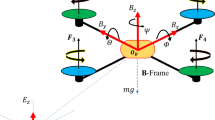Abstract
This article mainly focuses on the ability of the quadrotor UAV to follow the desired trajectory when it is subjected to various external disturbances. In order to solve this problem, a closed-loop six-degree-of-freedom full control system will be proposed in the article. The sliding mode integral technology is introduced when designing the filter, which effectively solves the “computational explosion” problem in the traditional backstepping method by avoiding the analytical derivation process of the virtual control input. At the same time, an backstepping controller based on the above command filter is designed. After theoretical analysis, the stability of the closed-loop system is guaranteed, and the effectiveness of this method is further verified through simulation experiments.
Access this chapter
Tax calculation will be finalised at checkout
Purchases are for personal use only
Similar content being viewed by others
References
Liu, H., Bai, Y., Lu, G., Zhong, Y.: Robust attitude control of uncertain quadrotors. IET Control Theory Appl. 11(2), 406–415 (2015)
Nonami, K.: Prospect and recent research & development for civil use autonomous unmanned aircraft as UAV and MAV. J. Syst. Des. Dyn. 1(2), 120–128 (2007)
Lee, T., Leok, M., McClamroch, N.H.: Nonlinear robust tracking control of a quadrotor UAV on SE(3). Asian J. Control 15(2), 391–408 (2013)
Yuan, C., Zhang, Y., Liu, Z.: A survey on technologies for automatic forest fire monitoring, detection, and fighting using unmanned aerial vehicles and remote sensing techniques. Canadian J. ForestbRes. 45(7), 783–792 (2015)
Xu, R., Özgüner, Ü.: Sliding mode control of a class of underactuated systems. Automatica 44(1), 233–241 (2008)
Xiao, B., Yin, S.: A new disturbance attenuation control scheme for quadrotor unmanned aerial vehicles. IEEE Trans. Industr. Inf. 13(6), 2922–2932 (2017)
Castillo, P., Dzul, A., Lozano, R.: Real-time stabilization and tracking of a four-rotor mini rotorcraft. IEEE Trans. Control Syst. Technol. 12(4), 510–516 (2004)
Bo, G., Xin, L., Hui, Z., Ling, W.: Quadrotor helicopter attitude control using cascade PID. In: 2016 Chinese Control and Decision Conference (CCDC), IEEE, Yinchuan, China (2016)
Zhang, Z.: Application of PID simulation control mode in quadrotor aircraft. In: 2020 International Conference on Computer Engineering and Application (ICCEA), IEEE, Guangzhou, China (2020)
Moreno-Valenzuela, J., Pérez-Alcocer, R., Guerrero-Medina, M., Dzul, A.: Nonlinear PID-type controller for quadrotor trajectory tracking. IEEE/ASME Trans. Mechatron. 23(5), 2436–2447 (2018)
Karahan, M., Kasnakoglu, C.: Modeling and simulation of quadrotor UAV using PID controller. In: 11th International Conference on Electronics, Computers and Artificial Intelligence (ECAI), IEEE, Pitesti, Romania (2019)
Liu, C., Pan, J., Chang, Y.: PID and LQR trajectory tracking control for an unmanned quadrotor helicopter: experimental studies. In: 35th Chinese Control Conference (CCC), IEEE, Chengdu, China (2016)
Cohen, M.R., Abdulrahim, K., Forbes, J.R.: Finite-horizon LQR control of quadrotors on SE2(3) IEEE Robot. Autom. Lett. 5(4), 5748–5755 (2020)
Ríos, H., Falcón, R., González, O.A., Dzul, A.: Continuous sliding-mode control strategies for quadrotor robust tracking: real-time application. IEEE Trans. Industr. Electron. 66(2), 1264–1272 (2019)
Silva, A.L., Santos, D.A.: Fast nonsingular terminal sliding mode flight control for multirotor aerial vehicles. IEEE Trans. Aerosp. Electron. Syst. 56(6), 4288–4299 (2020)
Zuo, Z.: Adaptive trajectory tracking control of a quadrotor unmanned aircraft. In: Proceedings of the 30th Chinese Control Conference, IEEE, Yantai, China (2011)
Chen, F., Wu, Q., Jiang, B., Tao, G.: A Reconfiguration scheme for quadrotor helicopter via simple adaptive control and quantum logic. IEEE Trans. Industr. Electron. 62(7), 4328–4335 (2015)
Tian, B., Cui, J., Lu, H., Zuo, Z.: Adaptive finite-time attitude tracking of quadrotors with experiments and comparisons. IEEE Trans. Industr. Electron. 66(12), 9428–9438 (2019)
Ganga, G., Dharmana, M.M.: MPC controller for trajectory tracking control of quadcopter. In: 2017 International Conference on Circuit, Power and Computing Technologies (ICCPCT), IEEE, Kollam, India (2017)
Torrente, G., Kaufmann, E., Föhn, P., Scaramuzza, D.: Data-driven MPC for Quadrotors. IEEE Robot. Autom. Lett. 6(2), 3769–3776 (2021)
Selfridge, J.M., Tao, G.: Multivariable output feedback MRAC for a quadrotor UAV. In: 2016 American Control Conference (ACC), IEEE, Boston, MA, USA (2016)
Kayacan, E., Maslim, R.: Type-2 fuzzy logic trajectory tracking control of quadrotor VTOL aircraft with elliptic membership functions. IEEE/ASME Trans. Mechatron. 22(1), 339–348 (2017)
Mohajerin, N., Waslander, S.L.: Multistep prediction of dynamic systems with recurrent neural networks. IEEE Trans. Neural Netw. Learn. Syst. 30(11), 3370–3383 (2019)
Lin, X.L., Wu, C.F., Chen, B.S.: Robust adaptive fuzzy tracking control for MIMO nonlinear stochastic poisson jump diffusion systems. IEEE Trans. Cybern. 49(8), 3116–3130 (2019)
Zhou, L., Zhang, J., She, H., Jin, H.: Quadrotor UAV flight control via a novel saturation integral backstepping controller. Automatika 60, 193–206 (2019)
Zuo, Z., Wang, C.: Adaptive trajectory tracking control of output constrained multi-rotors systems. IET Control Theory Appl. 8(13), 1163–1174 (2014)
Acknowledgments
This works is partly supported by the Natural Science Foundation of Liaoning, China under Grant 2019MS008, Education Committee Project of Liaoning, China under Grant LJ2019003.
Author information
Authors and Affiliations
Editor information
Editors and Affiliations
Rights and permissions
Copyright information
© 2021 Springer Nature Switzerland AG
About this paper
Cite this paper
Su, Z., Zhang, A., Wang, S. (2021). Flight Control for 6-DOF Quadrotor via Sliding Mode Integral Filter. In: Huang, DS., Jo, KH., Li, J., Gribova, V., Hussain, A. (eds) Intelligent Computing Theories and Application. ICIC 2021. Lecture Notes in Computer Science(), vol 12837. Springer, Cham. https://doi.org/10.1007/978-3-030-84529-2_13
Download citation
DOI: https://doi.org/10.1007/978-3-030-84529-2_13
Published:
Publisher Name: Springer, Cham
Print ISBN: 978-3-030-84528-5
Online ISBN: 978-3-030-84529-2
eBook Packages: Computer ScienceComputer Science (R0)



